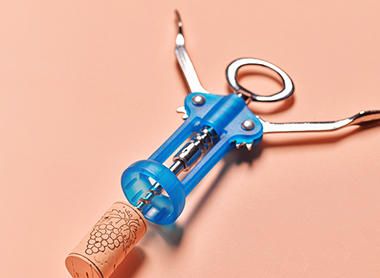what are the causes of addiction
Discover the complex and varied causes behind addictive behaviour, from psychological factors to environmental triggers, and learn how habits can escalate into addiction.
Our recent research has revealed that 1 in 7 accountants believe they know at least one person through work who has an addiction. To help you understand addiction better, discover the different types and recognise the signs of addiction, read this guide below.
In association with our partner psychologists, Psych Health.
Simply put, having an addiction is a loss of control over doing, taking, or using anything to the point where it may be damaging to your health - physical, mental and/or financial.
You may often initially connect addiction to drug or alcohol abuse, but there are many other forms of addiction.
There are two overarching categories of addictions: substance and behavioural.
You may be more aware of substance addiction, also known as substance use disorders, due to public support and campaigning for positive change. However, behavioural addictions, such as shopping, gaming, or gambling, are also highly prevalent within our society but can be harder to spot. Gambling, for example, may present itself as a fun, social activity to do with friends, but for some people, it can quickly develop into a problem.
Let's dive into these further:
Substance addiction or substance use disorder is when recreational use develops into an inability to control your consumption urges. Alcohol, prescribed or illicit medication, and narcotics are types of substance addiction you may be more familiar with, but caffeine and nicotine are also addictive, with the power to alter your daily life.
medical professionals may consider the following ten aspects to diagnose:
If you've noticed these signs in yourself and feel worried, we have further guidance for getting help here.
Behavioural addictions are when you are addicted to a specific behaviour or activity.
These can be difficult to notice at first. But like substance addiction, once it passes the point of recreational enjoyment and you can no longer control your urges, it may be an addictive behaviour. Often, behavioural addictions and their causes are linked to mental health disorders.
Food addiction is when the signals of fullness or satisfaction are misconstrued as reward signals to your brain when consuming highly palatable food and alcohol-free drinks (like fizzy juice). As a result, you may continue to consume this specific product regularly when you aren't hungry or thirsty.
A gambling addiction develops when you can't control your urge to gamble, leading to damaging behaviours that affect your life or others around you. With the ease and accessibility of online gambling, it’s now become even more prevalent and hidden. Sports betting, casino games, virtual slot machines and even the lottery are just a few examples of activities that may lead to gambling addictions.
Playing video, PC, or console games might be your escape from the real world and the pressures surrounding you. However, this may become a harmful addiction if your gaming habits begin affecting relationships, work, school, or your health (like sleep patterns).
By design, the internet and social apps are moreish, inviting you to click or scroll just that little longer. However, the constant stimulation and instant gratification these platforms provide could change your brain's chemistry, resulting in addictive behaviour.
This may also become a gateway to other behavioural addictions like gambling or shopping. The continual stream of notifications and updates can create a sense of urgency, subconsciously encouraging you to act on impulse.
A little shopping spree to treat yourself can be an enjoyable activity. So much so, that it’s been coined as "retail therapy." However, when you feel the compulsion to avoid your feelings, like anxiety or stress, by shopping instead, this may be a sign you have an addiction. If this significantly impacts your life, finances, or relationships, we recommend seeking support from a trusted source or person.
This term describes a condition where someone has an intense and compulsive need to engage in sexual activities, often to the point where it interferes with their daily life and relationships. Sex addictions may include pornography use, masturbation, having multiple sexual partners, or engaging in risky sexual behaviour.
It's important to understand that sex addiction is a real and recognised mental health condition that could significantly impact your life.
An addiction to stealing, also known as Kleptomania, is an impulse control disorder. If you suffer from this, you may have difficulty resisting the temptation or powerful urge to steal items you generally don't need. This often involves affordable or low-value items because you are addicted to the adrenaline rush of the activity.
With the internet and social media at our fingertips, it’s now easier than ever to get swept up in addictive behaviours. From ordering Uber Eats to browsing through porn, shopping, gambling, and gaming, these activities are just a tap away. Therefore, it's essential to be mindful of the signs and seek help if they're causing issues in your life.
Remember, caring for our mental health is as important as physical and financial health. So, if you feel worried about yourself or someone you love, please reach out for help or even just to have a friendly, supportive conversation.
The causes of addiction are varied and complex and will differ from person to person. Click below to find out how psychological and environmental factors can impact someone.
If you’re worried that you or someone you know might have an addiction, click below to know the signs to look out for.

Discover the complex and varied causes behind addictive behaviour, from psychological factors to environmental triggers, and learn how habits can escalate into addiction.

Are your daily routines just habits or something more concerning? Can a habit turn into an addiction, and how can you tell the difference? With 1 in 10 accountants sharing with us that their drinking habits have negatively impacted their life, we explore the distinction between a habit and an addiction...

Being part of someone’s support network is incredibly brave and thoughtful, but we understand this can have challenging effects on your own health. We’re here to help you navigate your emotions and recognise that looking after yourself is just as important as helping someone you care about.

Addiction is a difficult journey, but it's not impossible to overcome. In this article, we'll explore where to find help and the steps you can take to recover from addiction.
We support past and present members of the Institute of Chartered Accountants of England and Wales (ICAEW), ACA students, ICAEW staff members, and the family and carers of members and students.
Not sure if you’re eligible? Use our interactive eligibility tool to check if you or your family could get support.
Most of our services, including mental health support and legal advice, are provided free regardless of your financial circumstances. For our financial grants, we will conduct an assessment, looking at your income and assets, to determine what help we can provide.